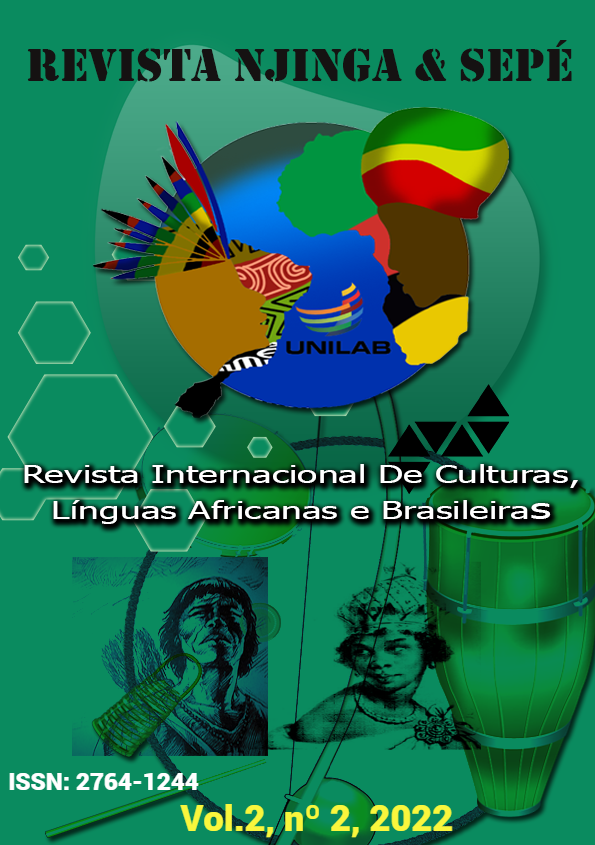10.Nsamu ya nkinkulu kye Soyo: yetu moko ye maduki
Narrativa de origem do Soyo: uma entrevista com mais velhos
Mots-clés :
Nsolongo, Yana ma nKentu, MalongiRésumé
E nsamu yayi nsamu twa zaya e mpila e nkikulu kye Soyo, nxi ya Zaire, muna nxi ya Ngola, y jingidilwanga. Twa zaya e dituki dya nsolongo twa vovana ye maduki matatu o ku Soyo: tato Tomás Paulo, tato Paulo Pedro, yo tato Estevão Nvemba. Muna dikanda dya nsolongo, yo muna dikanda dya Bantu, maduki yantu a nkuma, be yikilwanga zayi benawu ba fete longa muna mavata mawu . Zevo, Eyindu yayi tu sanga o vuvu muna valor ya tradição tu monanga yo : minvovo yantu y vanikanga o zayi. Akuluntu twa vovesa ba kabinsa eyantu ba wacika edikanda dye Soyo dya Nxi, muna Kinkulu kya Mbanza Kongo. O zevo muna nsamu yayi tu lendi bakwisa e yana ma nkentu awevi ba monekwanga muna dituki dye Soyo ye valor benawu muna dilanda dyau.Yo nsamu yayi, e modelo ya entrevista não estruturada, twa mona e malongi tu fete bakwisa muna vovo ya maduki mye Soyo: o nkuma ya tradiçao ya vovo muna construçao ya identidade ya nsolongo.
***
A presente entrevista tem como objetivo conhecer a forma como são apresentadas as narrativas de origem do município do Soyo, na província do Zaire, norte de Angola. Para tanto, entrevistamos no município três mais velhos: senhor Tomás Paulo, o senhor Paulo Pedro e o senhor Estevão Nvemba. O mais velho é considerado na cultura nsolongo e na cultura bantu de sábio, ou seja, uma biblioteca viva que passa os seus ensinamentos para as gerações posteriores. Tomamos, com isso, a ideia de que pela tradição oral se recebe a herança de conhecimentos. Os mais velhos entrevistados discorrem sobre as personagens envolvidas na formação da província do Soyo, no antigo reino do Kongo, a partir de descendentes de Mbanza Kongo, a capital do reino. A partir destas personagens, notamos que a figura feminina se impõe pelo seu papel na construção dessa etnia. Nesta entrevista não estruturada, de forma a permitir uma maior liberdade aos entrevistados, observamos o papel da tradição oral na construção da identidade nsolongo.
Téléchargements
Références
KOSI, Eugénia Emília Sacala. Nsamu ya nkinkulu kye Soyo: yetu moko ye maduki. Njinga & Sepé: Revista Internacional de Culturas, Línguas Africanas e Brasileiras. São Francisco do Conde (BA), vol.2, nº 2, p.230-238, jun./dez. 2022.
Téléchargements
Publiée
Comment citer
Numéro
Rubrique
Licence
(c) Tous droits réservés NJINGA&SEPÉ: Revista Internacional de Culturas, Línguas Africanas e Brasileiras 2022

Ce travail est disponible sous licence Creative Commons Attribution - Pas d'Utilisation Commerciale - Pas de Modification 4.0 International.
Les auteurs qui publient dans cette revue acceptent les conditions suivantes:
Les auteurs conservent le droit d'auteur et accordent à la revue le droit de première publication, l'œuvre étant simultanément concédée sous licence Creative Commons Attribution License, qui permet le partage de l'œuvre avec reconnaissance de la paternité de l'œuvre et publication initiale dans ce magazine.
Les auteurs sont autorisés à assumer séparément des contrats supplémentaires, pour la distribution non exclusive de la version de l'ouvrage publié dans cette revue (par exemple, publication dans un référentiel institutionnel ou en tant que chapitre de livre), avec reconnaissance de la paternité et publication initiale dans cette revue.
Les auteurs sont autorisés et encouragés à publier et distribuer leurs travaux en ligne (par exemple dans des référentiels institutionnels ou sur leur page personnelle) à tout moment avant ou pendant le processus éditorial, car cela peut générer des changements productifs, ainsi que citation des travaux publiés (voir l'effet du libre accès).




